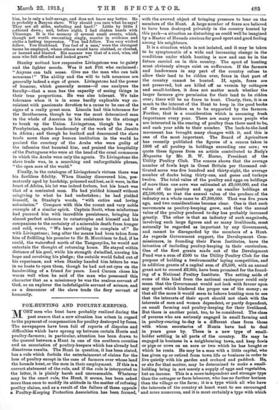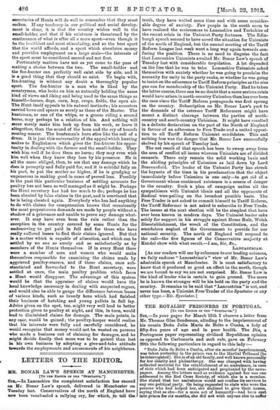FOX-HUNTING AND POULTRY-KEEPING.
MOST men who hunt have probably realized during the past season that a new situation has arisen in regard to the payment of compensation for poultry destroyed by foxes. The newspapers have been full of reports of disputes and difficulties which have sprung up between certain Hunts and poultry-farmers; in particular, attention has been drawn to the quarrel between a Hunt in one of the southern counties and an association of poultry-keepers which has already bad disastrous results. The Hunt in question, it has been stated, has a rule which forbids the entertainment of claims for the loss of poultry except in the case of farmers over whose land the hounds hunt, or the men in their employment. If this is a correct statement of the rule, and if the rule is interpreted to the letter, it is plainly harsh and unreasonable. Whatever may be the exact rule, the Hunt, it seems, has been asked more than once to modify its attitude in the matter of refusing poultry claims, and as a result of the failure of these appeals a Poultry-Keeping Protection Association has been formed,
with the avowed object of bringing pressure to bear on the members of the Hunt. A large number of foxes are believed to have been destroyed privately in the country hunted by this pack—a situation as disturbing as could well be imagined by a Master of Hounds anxious for good sport and good feeling among his neighbours.
It is a situation which is not isolated, and it may be taken to be symptomatic of a wide and increasing change in the conditions under which hunting is now and can be in the
future carried on in this country. The sport of hunting must obviously always exist on sufferance. If the farmers and landowners in any part of the country refuse to allow their land to be ridden over, foxes in that part of the country cannot be hunted. If, again, foxes are not preserved, but are killed off as vermin by cottagers and small-holders, it does not matter much whether the larger farmers give permission for their land to be ridden over; there will be no foxes to hunt. Clearly, then, it is as much to the interest of the Hunt to keep in the good books of the small-holders as to be supported by the farmers.
Further, that is a consideration which is assuming fresh importance every year. There are many more people who are interested in the rearing of poultry than there used to be,
and each year adds to their number. The back-to-the-land movement has brought many changes with it, and this is one of the most important. The Board of Agriculture has recently published the figures of a census taken in 1908 of all poultry in holdings exceeding one acre; we quote these figures from an article contributed to Baily's
Magazine by Mr. B. W. Horne, President of the
Utility Poultry Club. The census shows that the average number of fowls kept in Great Britain per thousand cul- tivated acres was five hundred and thirty-eight, the average number of ducks being thirty-one, and geese and turkeys twelve. The total value of the poultry and eggs on holdings of more than one acre was estimated at £5,000,000, and the
value of the poultry and eggs on smaller holdings at £2,500,000, so that the annual value of the produce of the
industry as a whole came to £7,500,000. That was five years ago, and two considerations become clear. One is that such movements as poultry-keeping grow, and that the annual value of the poultry produced to-day has probably increased greatly. The other is that an industry of such magnitude, involving such large figures and so many livelihoods, must naturally be regarded as important by any Government, and cannot be disregarded by the members of a Hunt. As regards Government support, the Development Com- missioners, in founding their Farm Institutes, have the intention of including poultry-keeping in their curriculum.
One of the first grants made out of the Development Fund was a sum of £500 to the Utility Poultry Club for the purpose of holding a twelvemonths' laying competition, and in addition grants of a capital sum of £8,500, with an annual grant not to exceed £2,000, have been promised for the found- ing of a National Poultry Institute. The setting aside of sums of this kind from the national exchequer could only mean that the Government would not look with favour upon any sport which hindered the proper use of the money ; so that all the more it would seem to behove hunting men to see that the interests of their sport should not clash with the interests of men and women dependent, or partly dependent, on small farming and poultry-keeping for their livelihood.
But there is another point, too, to be considered. The class of persons who are seriously engaged in small farming and in poultry-rearing to-day is a different class from those with whom secretaries of Hunts have had to deal in years gone by. There is a new type of small- holder settling in all parts of the country. He may be engaged in business in a neighbouring town, and keep fowls or pigs or cows on an acre or two which he has bought or which he rents. He may be a man with a little capital, who
has given up or retired from town life or business in order to
live quietly with his garden and orchard and paddock. He, or she for that matter, may be determined to make a small-
holding bring in not merely a supply of eggs and vegetables,
but an income. This is a more independent and stronger type than the cottager or farm labourer, who has no further horizon than the village or the farm; it is a type which all who have the interests of the country at heart want to see encouraged and more numerous, and it is most certainly a type with which
secretaries of Hunts will do well to remember that they must reckon. If any tendency in our political and social develop- ment is clear, it is that the country wishes well to the small-holder, and that if his existence is threatened by the continuance of what is after all a mere sport—even though it be the healthiest and most stimulating, and so the best sport that the world affords, and a sport which circulates money and provides employment on a large scale—the interests of the sport must be considered second and not first.
Fortunately matters have not as yet come to the pass of making a choice between the two. The small-holder and the fox-hunter can perfectly well exist side by side, and it is a good thing that they should so exist. To begin with, fox-hunting is without any doubt a thoroughly popular sport. The fox-hunter is a man who is liked by the countryman, who looks on him as naturally holding the same kind of views and liking and being used to the same things as himself—horses, dogs, corn, hay, crops, fields, the open air. The Hunt itself appeals to his natural instincts ; his ancestors carried bows and spears as surely as those of the Master. The huntsman, or one of the whips, or a groom riding a second horse, may perhaps be a relation of his. And nothing will more surely make him look up from his work, or leave it altogether, than the sound of the horn and the cry of hounds coming nearer. The huntsman's horn stirs like the roll of a drum. It is just this universality of the appeal which hunting makes to Englishmen which gives the fox-hunter his oppor- ttmity in dealing with the farmer and the small-holder. They wish him well if he does them no harm; they may even wish him well when they know they lose by his presence. He is sal the more obliged, then, to see that any damage which he does is promptly and fully paid for, and it is suicidal folly on his part, to put the matter no higher, if he is grudging or ungenerous in making good in cases of proved loss. Possibly in the past this particular business of settling accounts for poultry has not been as well managed as it might be. Perhaps the Hunt secretary has had too much to do ; perhaps he has been cheated by false claims in the past, and is convinced that he is being cheated again. Everybody who has had anything to do with claims for compensation knows that occasionally the most preposterous demands are made by people without a shadow of a grievance and linable to prove any damage what- ever. It may have even been the rule rather than the exception in the country covered by some Hunts for the undeserving to get paid in full and for those who have really suffered losses to find their claims ignored. But that is a matter which is capable of alteration, and which can be settled by no one so surely and so satisfactorily as by members of the Hunts themselves. If in every Hunt there were a number of men and women who would make themselves responsible for examining the claims made by aggrieved poultry-rearers, and if these claims, once sub- stantiated and forwarded to the Hunt secretary, were settled at once, the main poultry problem which faces a Hunt would disappear. The advantage of this system would be that the appraiser of claims would have the local knowledge necessary in dealing with suspected rogues, and would also be able to gauge the difference between losses of various kinds, such as broody hens which had finished their business of hatching and young pullets in full lay. Advice given on the spot, too, might very well lead to better protection given to poultry at night, and this, in turn, would lead to diminished claims for damage. The main points, in any case, would be gained; the poultry-keeper would realize that his interests were fully and carefully considered, he would recognize that money -would not be wasted on persons who made a business out of claiming for damages, and he might decide finally that more was to be gained than lost in his own business by adopting a give-and-take attitude towards the employments and amusements of his neighbours.















































 Previous page
Previous page